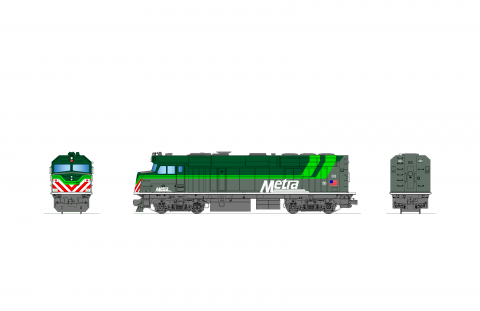
Demonstrating its leadership and commitment to innovation and cleaner energy, Metra is challenging the industry to create a zero-emission commuter locomotive by converting an older engine from diesel to one powered solely by batteries.
The Metra Board of Directors at its April meeting today approved the issuance of a Request for Proposals (RFP) that will ask manufacturers to propose solutions to convert three of Metra’s older F40PH-3 diesel locomotives to zero-emission battery power. The RFP will be issued in the upcoming days; the contract is expected to be awarded in the fall and the first solutions should be delivered about 30 months later.
“This proposal could be game-changing,” said Metra Executive Director/CEO Jim Derwinski. “We have been monitoring the development of this technology for several years and believe the time is right to work with the industry and set a path for a brighter and cleaner future. With the Biden administration pushing for greener energy, we believe this is the perfect time to pursue this course of action. As we emerge from the fog of this pandemic, we see this as an opportunity to transform Metra, and to become a cleaner partner in the region. And this is only the first step.”
Metra estimates that replacing three older diesel locomotives with zero-emission batteries would reduce nitrogen oxides (NOx) emissions by more than 100 tons per year and particulate matter (PM) emissions by more than two tons per year. By replacing diesel power with battery power, Metra will significantly reduce its emissions footprint and greatly improve air quality for its riders and the Chicago region.
Metra will require the zero-emission locomotives to be fully compatible with its existing railcars and diesel locomotives. They must be capable of operating on any Metra line with trains that range in size from two to 11 cars, and they must be capable of providing a safe and comfortable ride at all speeds up to the maximum speed of 79 mph. The batteries must also power onboard systems, such as lighting, intercoms and HVAC. The locomotives may be painted in a green version of Metra’s paint scheme (per the conceptual illustrations) to indicate the green technology.
Respondents to the RFP will have to address several key questions: Operating distance? Recharge Time? Operations in Chicago weather? Life cycle maintenance costs? Supporting infrastructure?
The answers to those questions will help determine if Metra proceeds with the purchase and where and how the locomotives would be used in the Metra system. The Rock Island Line’s Beverly Branch is a likely candidate for the first use because of its shorter length; a battery-powered train could make several trips before needing to be recharged.
Metra has taken other recent steps to reduce its diesel emissions, including:
- Seeking to purchase six switch locomotives that meet the Environmental Protection Agency’s (EPA) Tier IV emissions standards, the highest standards currently in effect, and one zero-emission, all electric-powered switch locomotive.
- Ordering 15 remanufactured locomotives that meet the EPA’s Tier 3 emissions standards, with an option to buy up to 27 more. These locomotives will be replacing Tier 0 emissions locomotives currently in service. The first of those locomotives is expected to be delivered in early 2022.